Iran, Belarus Strengthen Defense Ties Amid Global Concerns
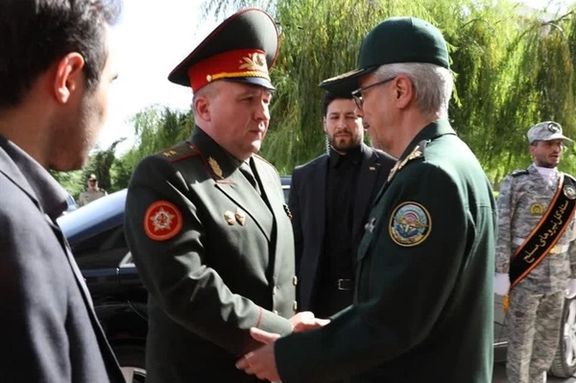
Iran and Belarus signed a defense cooperation deal, prompting the Iranian Armed Forces' General Staff to stress the importance of boosting mutual “defense ties”.

Iran and Belarus signed a defense cooperation deal, prompting the Iranian Armed Forces' General Staff to stress the importance of boosting mutual “defense ties”.
During a meeting with Viktor Gennadievich Khrenin, the Minister of Defense of Belarus, Mohammad Bagheri emphasized that global power shifts necessitate expanding security and military relations between Iran and Belarus.
The two sides also discussed the establishment of a joint commission for military cooperation.
Earlier, on Monday, Minister Khrenin signed a memorandum of understanding on defense cooperation with Mohammad Reza Ashtiani, the Iranian Defense Minister, in Tehran.
Details of the agreement have not been disclosed by the authorities of either nation. However, the Institute for the Study of War, a Washington-based think tank, published a report indicating Belarus' involvement in the establishment of an Iranian drone manufacturing plant in the south, specifically in the Gomel region.
Iran has faced extensive international criticism for supplying hundreds of Shahed-type kamikaze drones to Russia, reportedly used to target civilian infrastructure and residential areas in Ukraine. Additionally, American intelligence agencies have raised concerns about the construction of a drone factory in Russia with the assistance of the Islamic Republic.
Iran has supplied hundreds of drones to Russia since mid-2022, angering the United States and its key European allies who have imposed sanctions on a host of companies and individuals involved in their production and shipment to Russia.
Belarus is a key ally of Russia in its actions in Ukraine and a vital base for a portion of the Russian army and military mercenaries from the Wagner Group.
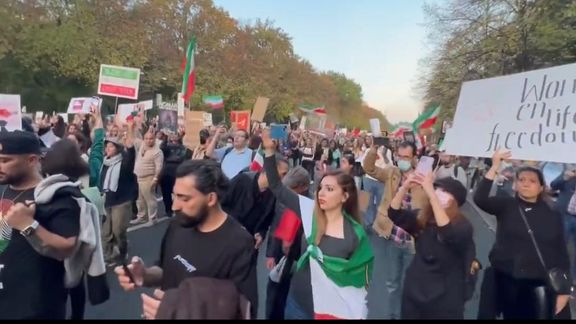
German-Iranians blasted Freiburg’s municipal government in Germany for voting last week to retain a twin city partnership with the Iranian city of Esfahan.
A majority of city council members from the left-wing parties, Greens and Social Democrats, rejected a motion from three small parties to end the controversial twin city partnership as protest to the Iranian regime’s gross human rights violations.
Iranian born Kazem Moussavi, who has campaigned for over twenty years against the dual city partnership, told Iran International that “It doesn’t matter to Mayor Martin Horn and his allies that independent civil society in Esfahan (Isfahan) is severely censored and brutally suppressed.
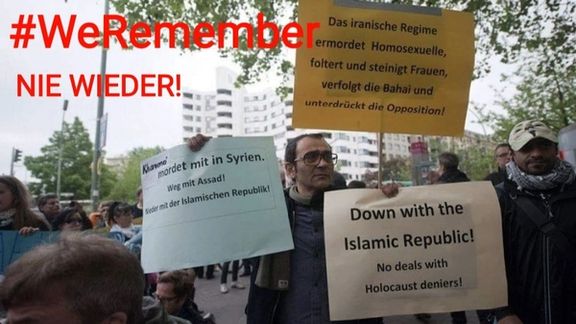
Dissidents and artists such as rapper Toomaj Salehi and Heshmatollah Tabarzadi were recently sentenced to long prison terms in Esfahan’s notorious torture prison, which is on the US sanctions list. Several women have also been executed there in recent months.”
The Freiburg Mayor has faced criticism from Amnesty International for going to great lengths to retain a city partnership with the clerical regime in Esfahan and for belittling grave human rights violations carried out by the regime.
According to the German media outlet SWR, Horn, who is not affiliated with a party, said he “wants to keep foot in the door” for the citizens of Iran by not shutting down the partnership. Horn refused to respond to numerous Iran International press queries.

Moussavi, who is the spokesman for the Green Party of Iran in Germany, also criticized Horn and the city council members who voted to retain the partnership, because they are ignoring that the morality police have been reactivated in Esfahan to ensure women wear the compulsory hijab.
The city council leader for the Free Voters, Johannes Gröger, issued a statement on behalf of his party and the JUPI (Young, Urban, Polarizing and Inclusive) and FL (Make Freiburg worth living) parties. Gröger said, “The conditions in Iran, especially in our partner city Esfahan, are getting worse and worse. Human rights are trampled on. The rights of women are disregarded, and the number of executions is increasing.” He added that “This is also supported by the incumbent mayor of our partner city and the local leadership elite.”
Behrouz Asadi, the head of the Democratic Forum of Iranians in Mainz, issued a public letter to Martin Horn ahead of the vote, urging him to end the twin city partnership and “send a clear statement against torture and executions and for the release of all political prisoners, especially with respect to the previously mentioned musician Toomaj Salehi.”
Asadi told Iran International that the city of Freiburg “must end its contact with the regime and support the citizens.” He said his organization will send a letter to the parties in Freiburg who voted to retain the partnership. He said the “morality police must be abolished” and termed the clerical regime a “terror regime and a murderous regime.”
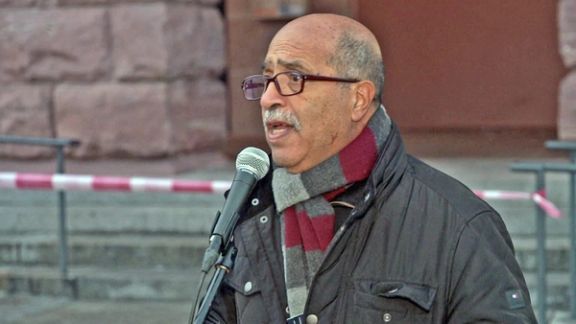
Asadi’s open letter was published in Persian and sent in German to Horn.
Freiburg, which is in the southwestern state of Baden-Württemberg, established its dual city partnership with Esfahan in 2000. Freiburg is the only city in Germany to have a municipal partnership with an Iranian regime-controlled city.
The German city of Weimar scrapped a partnership with Shiraz, in 2010, because regime officials on a trip to Germany refused to visit the Buchenwald concentration camp memorial.
The three parties opposed to the twin partnership in Freiburg said in their joint statement “The end of the twin city partnership should be a clear signal that Freiburg is committed to a world without oppression and human rights violations.”
Ulrich von Kirchbach, who serves as the Social Democratic Party’s cultural mayor in Freiburg, told SWR that “We don’t want to terminate any partnership because those who are now rebelling against the regime will feel completely abandoned.”
Simon Waldenspuhl, the leader of the JUPI political party, said the declaration issued by Freiburg in January is “too weak to express our contempt for such a brutal regime.” In January, Freiburg’s city government put the partnership on ice.
The FL city councilman, Wolf-Dieter Winkler, said “We increasingly must acknowledge that the persecution of people in Iran, including in our partner city Esfahan…even if declared dormant, no longer seems justifiable.
Horn is widely known as the German mayor who continues to do the heavy lifting for Iran’s regime via his strident activism to retain the dual city partnership. Critics argue Horn and the pro-Esfahan city council representatives have stained Freiburg’s reputation.
Sheina Vojoudi, who fled the Islamic Republic of Iran to Germany to escape persecution, told Iran International why a “German city prefers to turn a blind eye to all the human rights violations specifically in Esfahan.”

Vojoudi, who has been campaigning to end the partnership, added “Toomaj Salehi is a living proof of human rights violations in Esfahan who’s sentenced to six years and three months in prison for his critical rap songs. I would love to remind Freiburg of the Esfahan farmers who were shot by the regime forces for protesting severe water shortages. Hopefully the city council and the decision makers followed it closely that many of those innocent farmers lost their eyes.”
According to Vojoudi, who is an associate fellow for the Gold Institute for International Strategy, “Each partnership with this regime is a stab in our people’s back and of course mocks all the lives sacrificed and are being sacrificed for justice and humanity. Not condemnation but action proves that Germany truly cares for the human rights violations in Iran.”
Moussavi took Horn and the city council members, who support the partnership, to task for their alleged hypocrisy, noting that Esfahan is a center for Iran’s construction of atomic weapons, drones and rockets. Horn and the pro-partnership city council members ostensibly claim to be against jingoism and nuclear weapons.
Moussavi also sharply criticized the commissioner tasked with fighting antisemitism in Baden-Württemberg, Michael Blume, for failing to urge Mayor Horn and the city council members to pull the plug on the twin city partnership. Moussavi said “An antisemitism commissioner must not tolerate Freiburg’s relations with Esfahan, where Jews and other religious minorities are massively discriminated against and persecuted.”
Blume has faced massive criticism for lashing out at Iranian dissidents on Twitter as “corrupt exiled nationalists,” because they seek the toppling of the Islamic Republic and combat Iranian regime-sponsored Holocaust denial and antisemitism.
“Blume called people like me ‘corrupt exiled nationalists’ after I showed him leaked footage of Evin prison and told him that only criticism won’t help us and as a defender of human rights she should do more,” said Vojoudi.
She continued “But, in response, he insulted and discriminated against Iranians in exile. He called us corrupt but the rulers of their twin city [partnership], the officials of the Islamic Republic, are the most corrupt people on earth.”
Blume has refused to comment on his attacks on Iranian dissidents. In October, a court in Hamburg, Germany said statements made by Blume can be termed “antisemitic” and Blume’s critics can define him as “antisemitic.” The Simon Wiesenthal Center’s top Nazi hunter, Dr. Efraim Zuroff, urged Blume to resign.
Blume refused to answer Iran International media queries. The world-renowned human rights activist and former Soviet political prisoner, Natan Sharansky, told Iran International that Blume’s twitter activity is “antisemitic” because he stoked an anti-Jewish conspiracy theory.

Moscow’s military launched over ten Iranian-made Shahed drones against Ukraine’s capital and several others at a grain export terminal in the south of the country.
The attacks on Wednesday destroyed buildings in the port of Izmail, near NATO member Romania, and halted ships in their tracks as they prepared to arrive there to load up with Ukrainian grain in defiance of a de-facto blockade Russia reimposed in mid-July.
"Russian terrorists have once again attacked ports, grain, global food security," President Volodymyr Zelenskiy said on Telegram.
Chicago wheat prices rose by nearly 5 percent following the attack due to concern about a hit to global supplies from Ukraine.

More than 10 drones launched against Kyiv were all shot down according to Ukraine’s military but falling debris caused fires and damage to residential areas.
Governor Oleh Kiper of the southern Odesa Oblast said that some of the Iranian drones flying toward the grain port were shot down but others got through inflicting heavy damage to grain exporting facilities. He appealed to Ukraine's partners to provide more air defense systems to defend against Russian strikes.
Iran has supplied Russia with hundreds of Shahed kamikaze drones since mid-2022 that have been extensively used against civilian and infrastructure targets.
The United States and its European allies have imposed several rounds of sanctions on Iran for the drone deliveries and warned Tehran to stop its arms supplies to Moscow. Iranian officials continue to deny sending the drones despite overwhelming physical evidence provided to Western government and media.

In the midst of a military exercise in the three contested islands of the Persian Gulf, the IRGC Navy Commander reiterated Iranian sovereignty.
Alireza Tangsiri advised regional states on Wednesday to avoid involvement in "divisive plans of extra-regional countries”.
The islands of Greater and Lesser Tunbs and Abu Musa in the Persian Gulf have been a longstanding territorial dispute between Iran and the United Arab Emirates.
During the exercise, Tangsiri did not explicitly name any specific country but referred to a joint statement made last month by Russia and Arab countries in the Persian Gulf supporting the UAE's claims over the islands.
Tangsiri called the islands "the honor of the great nation of Iran" and vowed to protect the Islamic homeland's territorial integrity.
The ongoing exercise showcased the presence of a special unit and a "600 km long-range missile for defending the islands' territory".
However, the UAE considers Iran's sovereignty over these islands illegal, adding to the complexity of the territorial disputes which has become an international geopolitical issue.
Like China did in December, Russia signed a statement with the Gulf Cooperation Council in early July challenging Iran's ownership of three islands.
Iranian Foreign Minister Hossein Amir-Abdollahian recently expressed deep dissatisfaction with Moscow's explanations regarding the joint statement, Russia one of the regime’s closest allies.
The revival of the dispute comes amid the Iranian regime's efforts to strengthen its relations with the likes of UAE and Saudi Arabia under President Ebrahim Raisi's leadership.
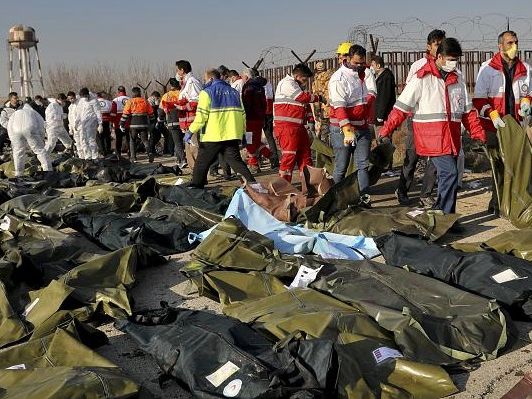
The Ontario Court of Justice once again declared that the shooting down of Flight PS752 by the Iranian regime constitutes "terrorist activity".
The court's ruling, issued on Monday, entitles the family plaintiffs of eight PS752 passengers to default judgment on liability, with damages set at $142 million. Each victim's family will receive over $16 million in damages and an additional $1 million for the pain and suffering caused by the tragic attack.
The court case was initiated by six individuals representing eight families of the victims of the flight. Notably, a similar verdict in favor of several other victims' families was previously issued in a case known as “Zarei et al vs Islamic Republic of Iran et al.”
Flight PS752 was shot down by two air-defense missiles fired by the IRGC shortly after taking off from Tehran's Imam Khomeini International Airport on January 8, 2020. The attack occurred in the aftermath of the IRGC's missile strikes on Iraqi bases hosting US troops, conducted in retaliation for the killing of IRGC Quds Force Commander Ghasem Soleimani in a US drone strike just five days earlier.
Tragically, all 176 passengers and crew members, including 63 Canadians, 10 Swedes, and 82 Iranian citizens, lost their lives in the disaster.

The US Ambassador to the United Nations has expressed concern over the use of Iranian unmanned aerial vehicles (UAVs) by Russia in Ukraine.
In a briefing on Tuesday, Linda Thomas-Greenfield stated that it is a “direct violation of UN Resolution 2231”. She revealed that Washington has requested the United Nations conduct an investigation into the matter.
In a statement to Iran International, Ambassador Thomas-Greenfield emphasized the significance of the investigation, highlighting that any other instances of Iranian UAVs being used elsewhere should also be condemned as it constitutes a violation of Resolution 2231.
In June, Iran International wrote of the US government disclosures that Russia, with the assistance of the Islamic Republic, is in the process of establishing a UAV production center approximately 960 kilometers east of Moscow. If completed, the factory is expected to significantly alter the dynamics of the war in Ukraine.
According to analysts from the US Defense Intelligence Agency, the establishment of this factory will substantially increase Russia's stockpile of UAVs compared to the previous supplies received from Iran.
As per the analysis conducted by the US Defense Intelligence Agency, Russia has received a total of 400 Shahed-131 and 136, and Mohajer drones from Iran, depleting Iran's stockpile completely.
While Iranian officials, including Ali Khamenei, have denied supplying arms to Russia for use in the Ukrainian conflict, John Kirby, the spokesman for the National Security Council of the White House, made an announcement in early-June that Russia had acquired hundreds of new drones from Iran.
Kirby reiterated that Iran has also facilitated the establishment of the UAV factory in Russia, enabling them to produce Iranian UAVs as early as next year.